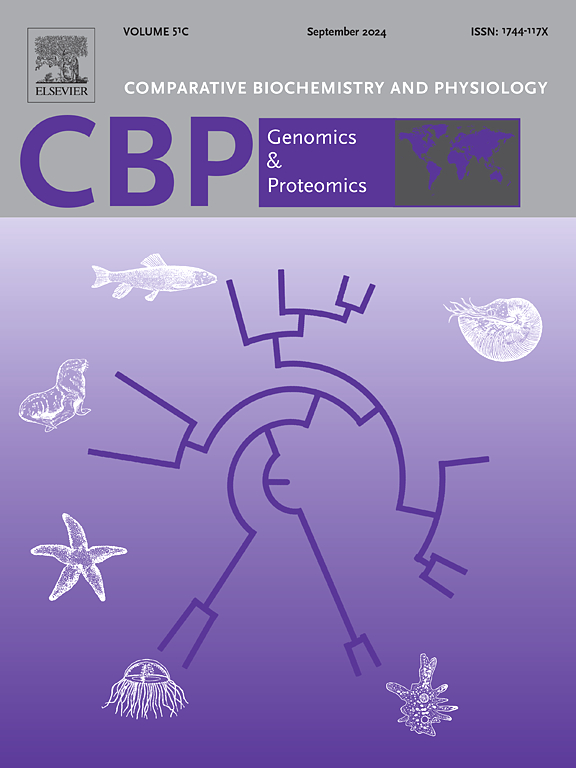长期热应激通过调节能量代谢和免疫反应重塑香港鲶鱼(Clarias fuscus)头肾对急性热休克的耐受
IF 2.2
2区 生物学
Q4 BIOCHEMISTRY & MOLECULAR BIOLOGY
Comparative Biochemistry and Physiology D-Genomics & Proteomics
Pub Date : 2025-02-08
DOI:10.1016/j.cbd.2025.101437
引用次数: 0
摘要
气候变暖导致的水温升高会影响鱼类的生存。然而,鱼类可以通过生理可塑性维持正常的生理功能。当温度波动超过它们的耐受范围时,即使是像志留形虫这样的抗应力物种也会受到影响。众所周知,鱼类具有适应性调节机制来重塑其对温度胁迫的耐受性,但对急性热休克的反应能力和适应性重塑后的恢复能力尚不清楚。研究了不同培养温度对香港鲶鱼(Clarias fuscus)急性热应激反应和应激恢复能力的影响。在常温(NT, 26°C)或高温(HT, 34°C)下培养90 d,急性热应激(34°C)和恢复(26°C)后分析其头肾转录组。结果显示,在整个温度处理过程中,NT组有8165个差异表达基因(DEGs), HT组有8537个差异表达基因(DEGs),各组对温度处理的不同阶段反应不同。富集分析表明,急性热应激时NT和HT组均富集了与能量代谢和免疫应答相关的通路。然而,急性热应激破坏了NT组的能量供应和氧化代谢,同时增强了HT组对反复热应激的反应能力。本实验表明,高温培养重塑了头部肾脏组织的能量代谢平衡,提高了抗应激和应激恢复能力。这些发现为进一步研究鱼类应对急性温度变化的可塑性奠定了基础。本文章由计算机程序翻译,如有差异,请以英文原文为准。

Long-term thermal stress reshapes the tolerance of head kidney of Hong Kong catfish (Clarias fuscus) to acute heat shock by regulating energy metabolism and immune response
Elevated water temperatures caused by climate warming can affect fish survival. However, fish can maintain normal physiological functions through physiological plasticity. When temperature fluctuations exceed their tolerance range, even stress-resistant species like Siluriformes are affected. It is known that fish have adaptive regulation mechanisms to reshape their tolerance to temperature stress, but the ability to respond to acute thermal shock and recover after adaptive remodeling remains unclear. This study investigated the effects of different culture temperatures on the ability of Hong Kong catfish (Clarias fuscus) to respond to acute heat stress and stress recovery. C. fuscus were cultured at normal temperature (NT, 26 °C) or high temperature (HT, 34 °C) for 90 days, and then their head kidney transcriptome was analyzed after acute heat stress (34 °C) and subsequent recovery (26 °C). The results revealed 8165 differentially expressed genes (DEGs) in the NT group and 8537 DEGs in the HT group during the entire temperature treatment process, with each group responding differently to various stages of temperature treatment. Enrichment analysis showed that both NT and HT groups had enriched pathways related to energy metabolism and immune response during acute heat stress. However, acute heat stress disrupted the energy supply and oxidative metabolism in the NT group, while enhancing the HT group's ability to respond to repeated heat stress. This experiment demonstrated that high-temperature culture reshaped the energy metabolism balance in the head kidney tissue, improving anti-stress and stress recovery abilities. These findings lay a foundation for further research on the plasticity of fish in coping with acute temperature changes.
求助全文
通过发布文献求助,成功后即可免费获取论文全文。
去求助
来源期刊
CiteScore
5.10
自引率
3.30%
发文量
69
审稿时长
33 days
期刊介绍:
Comparative Biochemistry & Physiology (CBP) publishes papers in comparative, environmental and evolutionary physiology.
Part D: Genomics and Proteomics (CBPD), focuses on “omics” approaches to physiology, including comparative and functional genomics, metagenomics, transcriptomics, proteomics, metabolomics, and lipidomics. Most studies employ “omics” and/or system biology to test specific hypotheses about molecular and biochemical mechanisms underlying physiological responses to the environment. We encourage papers that address fundamental questions in comparative physiology and biochemistry rather than studies with a focus that is purely technical, methodological or descriptive in nature.

 求助内容:
求助内容: 应助结果提醒方式:
应助结果提醒方式:


